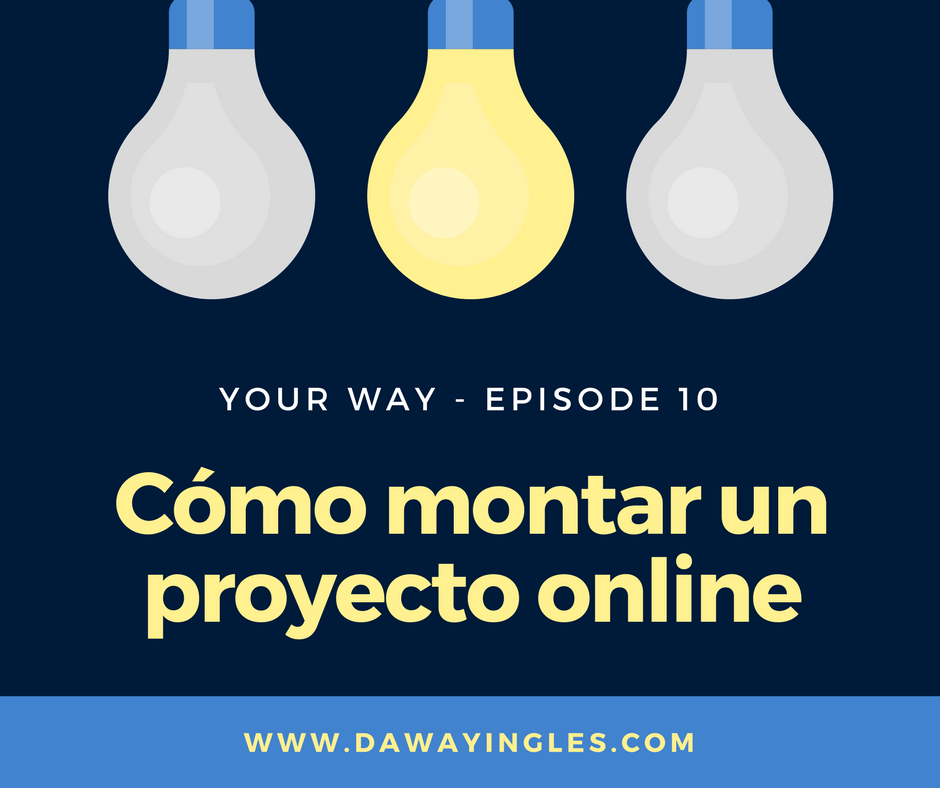¿Quiéres saber cómo montar un proyecto online? ¿Alguna vez te has planteado montar algo así, además de tu trabajo actual?
Hiyo!
How’s things? How’s life? Welcome to a new episode of Your Way!
In today’s podcast, Mónica and I answer a question from one of our readers, Carolina, from Ecuador. Carolina wrote to us and asked about how she could start her own online project. Quizá te sientas un poco como Carolina: tal vez quieras cambiar de trabajo, necesites una segunda fuente de ingresos, quieras empezar un proyecto como plan alternativo de futuro o simplemente quieras dar a conocer tu experiencia/hobby, etc…Can you speak about all these topics in English?
Well, you know that we love talking about these current topics of today’s world: the Internet, online projects, entrepreneurs, business, etc. We tried our best to answer Carolina’s question and to help her. Te dejo aquí el podcast que grabamos intentando ayudar a Carolina, al tiempo que te ofrecemos vocabulario y nuevas expresiones en inglés relacionadas con nuestra conversación.
Como siempre, el episodio está lleno de buen rollo e inglés muy práctico. Hope you enoy it!!
Cómo montar un proyecto online – Your Way 10
Usa este enlace para descargar el podcast en formato mp3
Ideas mentioned in this podcast
– Why today’s episode is so special! – 0:20
– Question of the day (Carolina’s question, from Ecuador): how to start an online project when you already have a full-time job – 1:09
– Tip 1: The key to being persevering and constant is having a higher purpose. Think of your purpose – 02:15
– Tip 2: try to find the time throughout your week (it can be at weekends, at nights, etc). You can also get up earlier, to get some extra hours – 04:35
– Accept that sometimes, to introduce a new project/passion/objective in your life, you will have an imbalance and that is okay – 06:07
– Tip 3: Do NOT leave your main job. Work on your side project until you validate it and get some attention from society (readers, listeners, an interview, subscribers, etc). How Mónica was contacted by the newspaper EL PAIS – 06:37
– Remember this big idea/line: if you want something that most people don’t have, you will have to do things most people don’t do. Also, think of it as a marathon, not a sprint – 09:04
– Doing difficult things (like mastering a language or creating your own job) is not a linear process. It has ups and downs, zigzags and turns, changes, etc – 11:20
– David’s big mistake when launching his online community and why you should not do the same. How Mónica left her day job to go online and our discussion on the word “hustle” – 12:13
– Tip 04: Find a team, a community or other people doing the same, to support and motivate you and learn in a group. You will be much happier and will learn a lot faster. An interesting discussion on the words “geek” and “nerd” – 19:09
– Tip 05: The only way to do something difficult is to break it down into sub-divisions, making lists of sub-actions and writing it down – 24:42
– “In time learning”: you only need to learn the next thing that you need, you don’t have to learn to do everything in one month – 26:29
– How to pronounce the Schwa sound or the “stupid” sound of English – 27:50
– Tip 06: Be ready to experiment, to make changes, to turn your direction, etc. Sometimes you win and sometimes you learn. Treat the process as a lot of experiments. Mónica’s take on “failure” and practicality – 28:18
– Summary of the keypoints of this podcast and answer to other listeners – 33:04
Vocabulary used in this episode
– A side project: un proyecto secundario, extra
– To pivot: pivotar, en el sentido de girar alrededor de algo o manejar dos cosas a la vez
– Your take on something: tu punto de vista sobre algo
– To juggle: hacer malabares / compaginar
– Persevering: perseverante
– An imbalance: un desequilibrio
– A 9-to-5 job: un trabajo con horario standard, de 9 a 5
– A timeslot: un hueco de tiempo o franja horaria
– To work on something: trabajar en algo (proyecto, aspecto, etc)
– To be at the right place at the right time: estar en el lugar correcto en el momento adecuado
– To validate something: validar algo, comprobar que funciona o es verdadero
– To dump something: dejar, abandonar algo (proyecto, un novio/a, etc)
– To go off doing something: que te deje de gustar hacer algo, perderle la motivación
– A line: una frase o cita escrita
– To make a sacrifice: hacer un sacrificio
– To be willing to do something: estar dispuesto/a a hacer algo
– To preach: predicar
– A chord: una nota musical/acorde
– To make a mistake: cometer un error
– “Don’t quit/leave your day job”: sigue haciendo lo que estás haciendo, lo que te da de comer
– To risk doing something: arriesgarse a hacer algo, correr el riesgo
– To be shit scared: estar acojonado/a
– To pay mortgage: pagar una hipoteca
– Pressure: presión
– To be on a waiting list: estar en una lista de espera
– To pay the bills: pagar las facturas
– To make ends meet: llegar a fin de mes
– A race: una carrera (deportivo o figurado)
– To hustle / a hustle: darse prisa, apurarse / un chanchullo o trapicheo
– To look for inspiration: buscar inspiración
– A geek: un entusiasta o friki de la tecnología
– A nerd: un ratón de biblioteca, antisocial (más peyorativo que geek)
– To look something up: buscar algo (en un diccionario, Google, etc)
– To get good marks/grades: sacar buenas notas (“mark” British, “grade” American)
– To work on/at weekends: trabajar los fines de semana (“on” American, “at” British)
– To break down something into…: dividir algo en…
– To cross something out: tachar algo
– To get overwhelmed: abrumarse, saturarse, que se te quede algo grande
– Chunks: trozos
– To test the waters: probar algo, experimentar, ver qué tal funciona
– To get tangled: enredarse, rallarse

